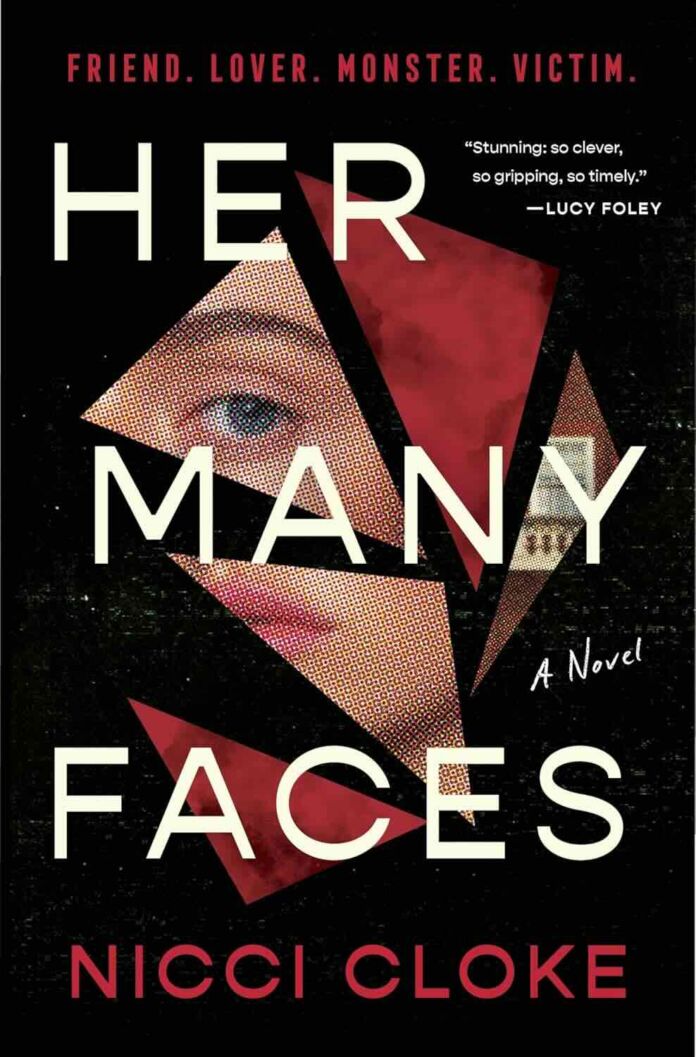In her latest psychological thriller, Her Many Faces, Nicci Cloke (who also writes as Phoebe Locke) crafts an intricate narrative that examines how a single woman can be perceived so differently through multiple male perspectives. Her Many Faces is a compelling exploration of truth, perception, and the dangerous power of conspiracy theories in our modern world.
Synopsis
When four influential men are poisoned at London’s exclusive March House club, waitress Katherine Cole becomes the prime suspect. As her trial unfolds, five men who knew her – her father John, journalist Max Todd, former lover Conrad Milton, childhood friend Gabriel, and defense lawyer Tarun Rao – each reveal their version of Katherine. Through their eyes, we see her as a devoted daughter, an obsessive lover, a troubled young woman influenced by online conspiracy theories, and possibly a cold-blooded killer.
Masterful Structure and Narrative Technique
The novel’s greatest strength lies in its innovative structure. Cloke masterfully weaves together multiple timelines and perspectives, creating a rich tapestry of Katherine’s life before and after the murders. Each narrator brings their own biases, blind spots, and emotional investment in Katherine’s story, making readers question whose version of events they can trust.
The author’s decision to tell the story primarily through male perspectives is particularly effective, highlighting how women are often defined and judged through the male gaze. This choice adds layers of complexity to Katherine’s character while commenting on broader societal issues of gender and power dynamics.
Character Development and Psychological Depth
Katherine Cole
The central figure emerges as a fascinatingly complex character. Through different perspectives, we see her evolution from a sweet, artistic child to a young woman potentially capable of murder. Cloke skillfully keeps readers guessing about Katherine’s true nature until the very end.
The Male Narrators
Each of the five main male narrators is well-developed with distinct voices and motivations:
- John’s sections are filled with parental love and guilt
- Max’s chapters reveal journalistic ambition tinged with growing doubt
- Conrad’s narrative exposes toxic masculinity and manipulation
- Gabriel’s perspective offers innocent devotion mixed with naivety
- Tarun’s professional detachment gradually shows cracks as he questions his own judgment
Themes and Social Commentary
The novel expertly explores several contemporary themes:
- The influence of online conspiracy theories and radicalization
- The power of perception and narrative control
- Class divisions and privilege
- Trauma and its long-lasting effects
- Gender dynamics and societal judgment
Writing Style and Pacing
Cloke’s prose is sharp and precise, with each narrative voice feeling authentic and distinct. The pacing is particularly well-handled, with revelations carefully timed to maintain tension throughout. The courtroom scenes are especially compelling, balancing legal procedure with psychological drama.
Minor Critiques
While the novel is overwhelmingly successful, there are a few areas where it could be stronger:
- Some plot threads, particularly those involving minor characters, feel slightly underdeveloped
- The conspiracy theory elements occasionally threaten to overwhelm the more nuanced character study
- A few transitions between perspectives can be jarring
Comparison to Other Works
Fans of Gillian Flynn’s Gone Girl and Alice Sebold’s The Lovely Bones will find similar themes of unreliable narration and feminine perspective in Her Many Faces by Nicci Cloke. The novel also shares DNA with recent successful courtroom dramas like Sarah Vaughan’s Anatomy of a Scandal.
Final Verdict
Her Many Faces by Nicci Cloke is a sophisticated psychological thriller that transcends genre conventions to deliver something more profound—a meditation on truth, perception, and the ways we construct identity through others’ eyes. While not perfect, it’s an impressive achievement that will leave readers questioning their own assumptions and biases.
Who Should Read This Book
- Fans of psychological thrillers with complex narratives
- Readers who enjoy courtroom dramas
- Those interested in exploring themes of truth and perception
- Anyone fascinated by the impact of conspiracy theories on modern society
Disclosure
I received an advance reader copy (ARC) of this book in exchange for an honest review. All opinions expressed are my own.
This innovative thriller showcases Cloke’s growth as a writer and her ability to tackle complex themes while maintaining suspense and readability. Despite minor flaws, it’s a compelling addition to the psychological thriller genre that will leave readers thinking long after the final page.





